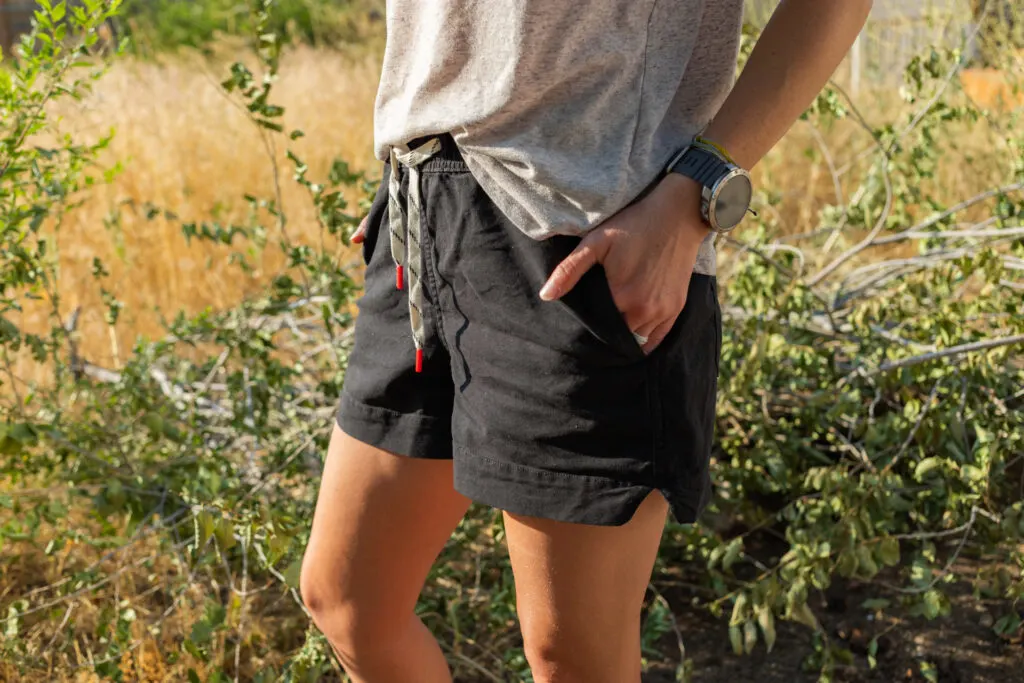There’s a whole wide-spread saying about cotton and other plant-based fibers in the outdoor industry: Cotton kills. Which might lead one to believe it should be avoided at all costs for any and every outdoor adventure. But is that really the case? Should you truly avoid it at all costs, or can it sometimes be the right choice for hiking, biking, or other outdoor activities? We’ll dive into the pros and cons of hiking in plant-based fibers like cotton, bamboo, and hemp so you can make the right (and the safe) decision.
What are Plant-Based Fibers?
First things first: what do we mean when we say “plant-based fibers” instead of “natural fibers?” We’re strictly referring to materials made from plants as opposed to animal-based materials like wool, which would be considered natural fibers. We’re vegan, so we choose not to use wool, but whether you do or not, wanted to make the distinction.
This article will specifically be talking about materials like cotton, hemp, Tencel, bamboo and other natural materials made from plants. There. Semantics addressed. Let’s get into it.

When Cotton Kills
If you’re thinking right off the bat that the phrase “cotton kills” seems like a gross overstatement, well, you’re not totally wrong. But there are times when cotton and other plant-based fibers are not only a bad idea, they could be potentially dangerous. So when should you never hike in cotton? Anytime it’s cold and wet, i.e. in the snow or on cool, rainy fall days.
That’s because plant-based fibers don’t dry quickly when wet, and that’s a big deal, because wet clothing–even if it’s just damp from sweat–can significantly increase your risk of hypothermia in cold weather. This is true even in temperatures as warm as 40 degrees Fahrenheit. Meaning you could suffer cold injuries multiple times faster just because your clothes aren’t dry. Meaning in winter, synthetics, which wick moisture and dry fast, are you best option, especially when it comes to base layers and outerwear like jackets.
So then, is there a time when cotton and similar fibers are OK?
When Hiking in Cotton is Probably Totally Fine
On the flip side, cotton, hemp and bamboo’s breathable, slow-drying properties that make them unsuitable for winter are what make them so great for summer. In fact, plant-based fibers are some of the most comfortable, cooling fabrics available, which can keep you from overheating in the summer. The slower rate of drying can even work to your advantage in extreme heat when cotton will provide a longer-lasting evaporative cooling effect (as your sweat or the water you just doused yourself with dries more slowly) than quick-dry synthetics.
And in drier climates like the desert west, they’ll still dry pretty dang fast, making them an excellent option for hiking. For example, on one 90º hike, our shirts were definitely soaked, but once we stopped for a lunch break, our shirts were dry in less than five minutes because humidity was about 14%. But not all summer conditions are created equal. So when choosing whether to hike in cotton, consider plant-based fibers’ various pros and cons.

Pros of Hiking in Plant-Based Fibers
Indeed, there’ are a lo’s a lot to love about hiking in hemp, cotton, and the like.
Comfort
- Softness: Plant-based fibers like cotton, hemp, and tencel are often softer to the touch and more pleasant on the skin compared to synthetic materials.
- Breathability: Lighter and looser plant-based clothing can be extremely breathable, reducing clinginess and encouraging airflow, which helps keep you cool.
- Evaporative Cooling: In hot climates, these fibers provide a lasting evaporative cooling effect as they dry slower than synthetics.
Sustainability
- Renewable Resources: Cotton, bamboo, and hemp are fully renewable resources that grow fast and can be replenished quickly.
- Organic Options: Organic plant-based fibers require no herbicides or pesticides.
- Biodegradable: Natural fibers biodegrade more readily than synthetics.
- Microplastics Reduction: Wearing plant-based fibers can reduce the contribution of microplastics to the environment.
Versatility
- Everyday Wear: Clothing made of these materials easily doubles as everyday apparel, offering versatility. You can wear a cotton shirt hiking and then to casual outings without looking out of place. Which means less material waste and less closet space required,

Cons of Hiking in Plant-Based Fibers
Of course, there are just as many cons to adventuring in these kinds of materials.
Lack of Technical Performance
- No Water Resistance: Plant-based fibers are not water-resistant and don’t wick sweat or dry as quickly as synthetic materials.
Humidity Concerns
- Slow Drying in Humidity: In humid climates, plant-based fibers can stay wet for prolonged periods, leading to discomfort on multi-day adventures. This can result in carrying heavy, wet clothing or wearing damp clothes the next day.
Weight and Heat
- Heavy and Hot: Heavier plant-based fabrics like denim can trap heat, potentially leading to heat-related illnesses in extreme conditions.
Specific Garments to Avoid
- Socks and Underwear: Cotton socks and underwear can become problematic on long hikes as they are prone to staying sweaty and causing chafing and blisters (check out our synthetic hiking sock recommendations instead).

Choosing the Right Plant-Based Apparel
For those who prefer plant-based fibers, choosing the right type of clothing is crucial. Opt for light, loose garments to promote breathability and comfort. Look for products made with organic materials to minimize environmental impact. Hemp and responsibly harvested bamboo are excellent sustainable options, requiring fewer resources and offering benefits like improved soil health and CO2 sequestration.
When we would recommend hiking in cotton or hemp
- For day-long or multi-day adventures in dry climates.
- For single-day adventures in humid climates.
- During dry, cool day hikes or activities like on sunny fall days.
When we would avoid hiking in cotton or hemp
- On multi-day adventures in humid climates when clothing won’t dry out and gets heavy.
- Any time it’s below 50º (just to be safe) and wet or snowy.

Our Favorite Sustainable Plant-Based Clothing for Hiking
Thinking you might want to do more adventuring in plant-based fibers now that you know the whole “cotton kills” thing might be a smidge overblown? We have good news! You probably have plenty of cotton or cotton blends in your wardrobe already! So you don’t have to go out and buy a thing! Huzzah! But if you want to level up your wardrobe, replace old, tattered clothing with with something new and super sustainable, or do as I’m doing and slowly transition your wardrobe to more sustainable materials as old garments wear out or go out of style, we’re happy too recommend some clothing and brands we absolutely love.
But since we know organic cotton, hemp and Tencel can be expensive, here’s your reminder to check your local thrift stores or used clothing sites like Poshmark or Geartrade for options. Because used clothing is always more sustainable than new.
•

Topo Designs
We’ve loved all sorts of Topo Designs clothing and gear over the years, from their rolling luggage to their hip packs, hiking pants and more. But we especially love the addition of the Dirt Collection to the brand’s line. It’s made of sustainable organic cotton, is dyed in a way that uses 95% less water, and is built to last. Items like the Dirt Shorts, Dirt Pants, and Dirt Desert shirts are durable but not too thick and look just as good for heading to the brewery or your nephew’s birthday party as they do on the trail. We may have just found our new favorite clothing.
•

Houdini Sportwear
We’re obsessed with Houdini, a European-based brand that takes sustainability seriously. They make some of our favorite circular synthetic gear like the Pace Flow Houdi and Cloud Jacket, but now also some of our favorite town-to-trail shirts. Namely, the Tree Dress and Tree Shirt. Since their made with super soft Tercel, they’re so light, so soft, so breathable, and so dang stylish we’re seriously about to buy one in every color (and we never do that)!
•

Pact Apparel
We already dig Pact’s organic cotton underwear for men and women and their sweats for ultra comfy lounging, so it’s no surprise that we also adore their ultralight Featherweight Slub sun hoody and soft and breathable Daily Twill Pants, which might just be our go-to travel pants from here on out. Plus, I almost never take off the On The Go-To Ribbed Crop Tank, which doesn’t require a bra, looks great on, and works just as well on its own as it does under your fave pair of overalls.
•

Astral
Yes, the brand that makes minimalist footwear and life jackets now also makes apparel. A few pieces, at least. But we’re fans. The hemp-and-recycled-polyester Kinisi shorts are so light and breathable, plus stylish, and the Sunset Hemp Hoodie will definitely be our go-to this fall.
•

Outerknown
Outerknown is all about sustainability, so it’s no surprise they make organic cotton clothing that’s suitable for the outdoors. Josh loves their cozy Blanket Shirt and midweight Groovy Pocket Tee and you can’t go wrong with their loose Laurel Linen shorts and comfy Saltwater Slub tee.
•

Jungmaven
Known for apparel made exclusively out of hemp and organic cotton, this brand is sustainable to the max. And we love lots of their clothing, including the stylish Venice Short, heavyweight but super comfy Boulder Tee, and the breezy, lightweight Essential Tank.
Bottom Line
While cotton and other plant-based fibers have their place in outdoor activities, it’s essential to consider the conditions. Avoid them in cold, wet weather, but if you find yourself in warm, dry climates, they can be a comfortable and sustainable choice. So get out there, hike in plant-based fibers (when appropriate), and wander on!
